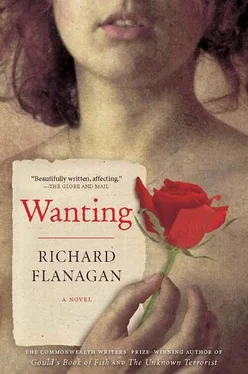He soon came to see that success is deaf to irony. Dickens was lauded in The Times and The Illustrated London News as having the powers of the best of professional actors, while The Athenaeum went even further: his performance, it declared, ‘might open a new era for acting’.
Shaking her head, Mrs Ternan closed The Athenaeum and put it down on the train seat next to her. A new era for acting! Opposite, a young man looked askance, for Mrs Ternan was dressed in black mourning, and was—improbably, impossibly and clearly disrespectfully—laughing. The train lurched around a bend and braked at the same time, its whistle screeching, with the effect of throwing everyone in the third-class carriage back and forth. When the train resumed a more settled ride and the passengers their original seating, she contained herself and apologised.
‘My sister,’ she said. ‘We buried her this morning in Salford.’ And then she would have burst into tears, if she were someone other than Mrs Ternan. But tears were what she wept on stage; tears were what she worked so hard to elicit from audiences; tears were art and art’s reward. This, though, was life. Mrs Ternan’s vicissitudes had trained her to laugh at life rather than be broken by it. ‘Never,’ she said to herself. Though she was a thoughtful woman, she lived by this unthinking mantra. Never ever give in. Never ever complain. Never ever admit to failure.
She crossed her hands in her lap so that he might not see the darned holes in her gloves, inwardly cursed herself for not having warmer clothing to wear in the unheated carriage, and looked out of the misty window as though she could see something of the iced landscape beyond as the train steamed northwards.
Still, the matter of the review amused her, and if it were not for her determination to remain respectable, she would have laughed again. A gentleman and his untrained children in front of a paper house! It may have been some new form of mesmerism, but it most certainly wasn’t theatre. And Mrs Ternan most certainly knew what theatre was; after all, she had been treading the boards—damp, rotten, creaking, splintered—since she was three. And though she believed in the theatre of Shakespeare and Molière, it had not repaid her passion. Here she was, she thought, fifty, alone, with three daughters, renting a very small house on the outskirts of London, with little income and, it would seem, diminishing prospects.
It wasn’t the life she had expected when, as a young woman, she’d looked to become another Mrs Siddons; when she had made more money than Fanny Kemble in Boston; when she played opposite Charles Kean; when she was celebrated for her acting in both the Old World and the New, and adored for her looks; when she had married a young Irishman of great ambitions—but he had died insane in Bedlam, and she had aged, and the good roles became fewer and the need to take whatever was offered grew stronger. She had journeyed through the provinces, lived on beer and bread and slimy old meat, trudged back and forth between damp lodgings and distant theatres, laid her dead young son out in a cot and then worked three nights in a row, coming home to his cold body each night, until she had enough to pay for his funeral.
She was determined for something better for her three daughters, but it was hard to know what that might be. There was the one-time Infant Prodigy—as she had been billed—her eldest daughter, Fanny, who had so enchanted audiences with her performances as a child but had not been able to carry that magic into her young adult life; there was Maria, ever able, but without overwhelming beauty or talent, equally destined for neither greatness nor fortune. Then there was her youngest, Ellen, who had also been on stage since she was three, who had danced polkas, played boys in tights, performed with acrobats, sang solos and duets and choruses, but who now, at eighteen, had the looks but not the vivacity on stage that might bring fortune.
Times were not good. Fanny and Maria had boldly attempted to set up a school for young ladies the previous summer, another form of fancy; it began with hope and an empty house and ended with neither. Though her friends in theatre helped in finding parts, Mrs Ternan could no longer rely on the Cordelias and Desdemonas that had once brought her a good living. Maria had a fortnight of bit parts at the Regency but nothing beyond it, while Fanny had found steady, if not starring, work as Oberon in a production of A Midsummer Night’s Dream .
She picked up The Athenaeum again, and took out the letter she had used as a bookmark, the letter that bore the news of Louisa’s death. She had been just fifty-three, with four children. Mrs Ternan did not know how much longer she might go on before she might suffer similarly—perhaps dying on stage like poor old John Pritt Harley, who had dropped like a stone a few nights before while playing Bottom, with poor Fanny standing right there next to him. And if she died, thought Mrs Ternan, what then would happen to her girls?
For the time being, she was able to continue to trade on the memory of her beauty and past triumphs, on her friendships and the acumen she had accrued over the course of a life of beds shared with children and bedbugs, of cheating theatre managers, threadbare clothes and the illusion of merriment. If she had often to make clear her respectability and virtue in face of a world that viewed her profession as little better than public prostitution, it was also a life not without its compensations: if you could through talent gain the public’s favour, you were able, in some measure, to live independent of men, of whom she had a diminishing opinion. It was a better world than that of governesses and seamstresses. But it was still harsh and terrifying, and all that sustained her was the friendship of other actors.
On the night she had received the news of Louisa’s death, leaving her the only surviving member of her family, Mrs Ternan had stifled her weeping with a pillow so her daughters would not hear her heart breaking and would never suspect what she now knew: that every death of those you love is the death also of so many shared memories and understanding, of a now irretrievable part of your own life; that every death is another irrevocable step in your own dying, and it ends not with the ovation of a full house, but the creak and crack and dust of the empty theatre. Mrs Ternan felt an infinite darkness beckoning; she resolved only that she would face it bravely. What could a gentleman and his children playing at theatrics know of any of it?
The young man was now looking at Ellen, who had travelled with Mrs Ternan to the funeral and who was sitting at the other end of the bench seat, engrossed, as always, in another novel. With great care, Mrs Ternan had mended Fanny’s old out-of-doors dress for Ellen to wear to the funeral; it did not look shabby, nor was its fawn colour—now faded to a dull grey—lurid, but, she felt, entirely respectable. To make it clear that the young attractive woman was not some fallen girl, but a chaperoned young lady, Mrs Ternan held out The Athenaeum to her.
‘Read this, my darling, and kindly tell me if you think you can ever trust a glowing review.’ She passed the magazine over; she was insistent. ‘For my money, I think never,’ she smiled, thinking how, until the final curtain swept her forever away, she would keep the show going. ‘Never ever.’
With the play that had buoyed him for so many months now over, Dickens lapsed into melancholy. He returned to writing Little Dorrit . In an ever-growing frenzy, he did not realise he was writing himself. London seemed damper, darker and dingier than ever, and everything and everybody on the streets and on the page felt entombed and dying. As he lived his crowded life, he wondered how it was possible to feel so alone. His solitude terrified him.
Читать дальше












